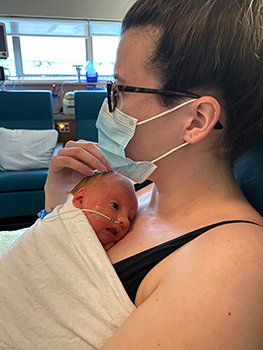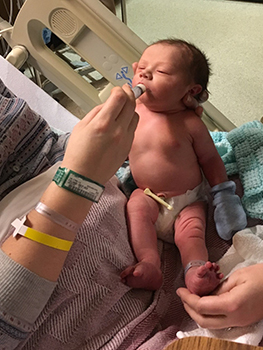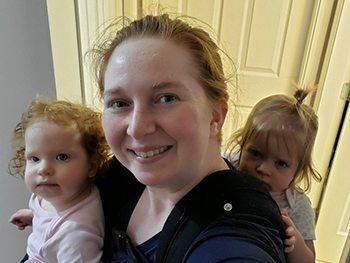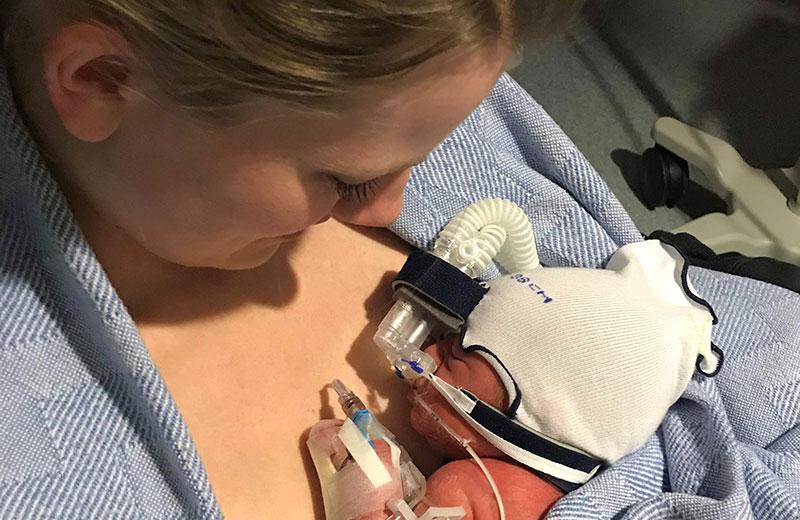Did you know that pasteurized donor human milk (PDHM) can be lifesaving for fragile newborns, such as those who are admitted to a neonatal intensive care unit (NICU)? From across BC, approved donors donate their milk to the provincial milk bank at BC Women’s Hospital in Vancouver. The milk bank screens potential donors, pasteurizes donor milk, and ships PDHM to NICUs across the province, including the one at the University Hospital of Northern British Columbia (UHNBC) in Prince George. Families in Northern BC are grateful for the chance to use PDHM for the first days of their babies’ lives. In this story, we share some of their experiences.
Meeting the needs of premature babies
When babies are born prematurely, there can be delays in mothers’ milk “coming in.” Human milk is so important for these fragile babies, and PDHM can be used while their mothers establish their own milk supply; it’s a reassuring gift during a stressful time.

Emily Wilson from Fort St. John describes how her son was transferred to the NICU after his birth: “He was born at 35 weeks’ gestation. I was so scared because as a maternity nurse, I knew about preemie babies and the complications they can experience. Since he born at less than 36 weeks, we had the option for donor milk for his feeds. It was a no-brainer decision for my husband and I – I signed the consent immediately. He received donor milk for about four days until I was getting enough through pumping to give him my milk fully. I’m so happy – he’s now 14 months old and still breastfeeding.”
Tanis Payne, from Burns Lake, also delivered her son prematurely at 33 weeks. “It was a whirlwind of emotions,” she says. “After the birth, in the NICU, I had the option of feeding him donor breast milk or formula, while I figured out pumping and could start to build a stash for him. I chose the donor milk, and I was so grateful for that option. To know my baby was still getting all the goodness that comes with breast milk, in those crucial, fresh hours after birth, was extremely comforting.”
Bridging the gap
Though PDHM is prioritized for sick or very tiny babies, there may be other reasons it can be used, including maternal health complications. For example, Lauren Apps, a NICU clinical nurse educator, says, “When a birth doesn’t go as planned and a mom is too sick or weak after delivery, it can be difficult to establish breastfeeding right away.”

This was true for Tiffany Wood from Fort Nelson. “Our twins were born at 37 weeks by C-section,” she says. “After they were born, one spent three days in the NICU. Because I’d lost so much blood during the procedure, I wasn’t able to produce colostrum or milk for several days. We wanted to breastfeed; we chose to have donor milk as their first food, as it was close to what they would get naturally from me.”
Ashley Fjellgaard from Prince George has a similar story. “I really wanted to breastfeed as soon as my son was born,” she says. “However, I was on heart medications until his birth and could not breastfeed until the medication was stopped. So, during the first 24 hours, my son received donated milk! I was so extremely grateful. I was able to start breastfeeding him on my own shortly after.”
Supporting breastfeeding
All of these families used PDHM while working towards breastfeeding their babies. UHNBC NICU staff regularly see how PDHM can help with those feeding goals. Lauren says, “Concern about having enough milk for their baby can be a major stressor for new moms in general. Having the reassurance that PDHM is available is one less thing for them to worry about while they’re recovering from labour and delivery, especially if it was an emergency, traumatic, or high-risk.”

Some, like Ashley, are able to breastfeed their babies on their own after just a few days. For others, like Tiffany, it takes a bit more time. “It wasn't for a few months until I had enough supply for two babies,” she says. “But ultimately, I was able to tandem-feed them for 16 months.”
Thank you to the donors!
UHNBC NICU staff are grateful for those who donate their milk to the provincial milk bank. Emily Fetterly, a nurse at the NICU, says, “I greatly appreciate the women who take the time to give their extra milk to babies in need. This program is so beneficial to everyone involved in the NICU.”
Of course, the parents couldn’t agree more. “It really does provide relief and comfort during a time where you don't have much control over anything,” says Tanis. “I’m grateful to the moms out there that unknowingly helped me though my NICU journey!”
Emily thinks about all the donors who made it possible for her son to receive PDHM in his early days and agrees. “If I could personally thank the women whose milk he got, I totally would,” she says. “Donor milk is an incredible privilege. I hope that donating to the milk bank will become more popular, and that we can give more NICU babies the amazing gift of breastmilk.”
The demand for donor milk is high and new donors are always needed. To learn more about donor human milk or about becoming an approved donor, see the links below:














Comments